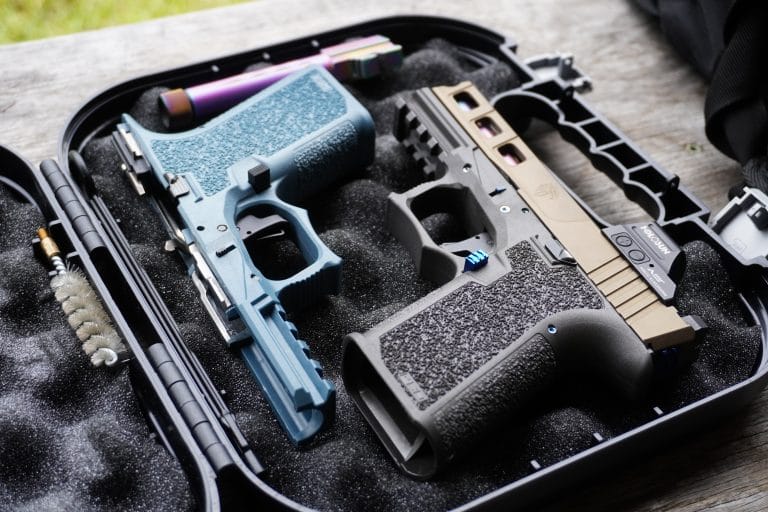For the second time in less than a year, the Supreme Court heard oral arguments in a case testing the ATF’s power to reinterpret existing federal firearms law. This time, the government seemed to find a more receptive audience.
On Tuesday, the nine justices presided over nearly an hour and a half of questioning in the case Garland v. VanDerStok. They probed the attorneys on both sides of the issue to determine if the ATF acted lawfully when, in 2022, at the direction of President Joe Biden in a bid to crack down on “ghost guns,” it reinterpreted the definition of a “firearm” under the Gun Control Act of 1968 to include unfinished firearms parts kits.
In many ways, the case is similar to the dispute over the Trump Administration’s ban on bump stocks in Cargill v. Garland. That rule involved the ATF similarly reinterpreting the 1934 National Firearms Act’s definition of “machinegun” to cover the targeted devices without an act of Congress. The federal government’s arguments in that case were met with a considerable amount of skepticism from the Court’s conservative justices during oral arguments back in February. And those same justices ultimately struck down the ATF’s rule as an unlawful exercise of agency power with a 6-3 decision in June.
Unlike in Cargill, however, at least some of the conservative justices this week seemed inclined to approve the ATF’s latest rule change.
For instance, Justice Amy Coney Barrett’s remarks seemed to tip her hand a bit at times, particularly following an exchange between Justice Samuel Alito and Solicitor General Elizabeth Prelogar.
“Here’s a blank pad, and here’s a pen, alright? Is this a grocery list?” Alito asked. “I put out on a counter some eggs, some chopped-up ham, some chopped-up pepper, and onions. Is that a western omelet?”
Prelogar retorted that in each of those examples, unlike the ATF’s rule, the constituent parts listed had other uses than just creating the completed object. Unfinished gun parts, on the other hand, serve only to construct a fully-functional firearm by her account. Then, Barrett chimed in with a hypothetical of her own that seemed to push back on Alito’s characterization of the kits.
“Would your answer change if you ordered it from HelloFresh and you got a kit, and it was like turkey chili, but all of the ingredients are in the kit?” she asked.
“Yes. And I think that that presses on the more apt analogy here, which is that we are not suggesting that scattered components that might have some entirely separate and distinct function could be aggregated and called a weapon in the absence of this kind of evidence that that is their intended purpose and function,” Prelogar said. “But, if you bought, you know, from Trader Joe’s some omelet-making kit that had all of the ingredients to make the omelet and maybe included whatever you would need to start the fire in order to cook the omelet and had all of that objective indication that that’s what’s being marketed and sold, we would recognize that for what it is.”
Barrett also had some of the toughest questions for Peter Patterson, the attorney representing those challenging the rule, during his portion of oral arguments. Patterson’s stated position was essentially that the ATF’s current rule unlawfully exceeds the bounds of the Gun Control Act and that the agency’s prior standard for determining when a part moved from unfinished to a regulated firearm, the so-called critical machining operations test, was both lawful and preferable.
Barrett, however, demurred at this suggestion.
“But it doesn’t appear in the statute,” Justice Barrett said. “It seems a little made up, right, the critical machining test?”
In addition to Justice Barrett, Chief Justice John Roberts also gave some indications that might concern gun-rights advocates hoping to see the ATF’s rule struck down. He didn’t provide much in the way of challenging questions to the Solicitor General during her portion of the argument. However, he did take the opportunity to cast doubt on the legitimate use cases of unfinished firearms receivers–outside of simply circumventing the GCA’s requirements–in an exchange with Patterson.
“What is the purpose of selling a receiver without the holes drilled in it?” the Chief Justice asked. “Well, I mean, drilling a hole or two, I would think, doesn’t give the same sort of reward that you get from working on your car on the weekends.”
Though skepticism over the legitimate appeal of unfinished firearm parts being available for hobbyists might be less relevant to the merits of the case than statutory interpretation, Roberts’ decision to press this point specifically with Patterson and nowhere else, at the very least, suggests he’s sensitive to the government’s position on the practical concerns with the proliferation of so-called ghost guns.
Finally, Justice Brett Kavanaugh indicated he might also be amenable to the ATF’s interpretation.
“Your statutory interpretation has force,” he told the Solicitor General at one point of the argument.
While he did voice some concern over well-meaning defendants ignorant of the law being swept into criminal prosecution by the ATF’s rule change, he seemed mostly satisfied by the Solicitor General’s assurances that prosecutions under the rule are focused on “willful” violators.
“Take the hypothetical — you truly believe you’re not violating the law, could you be charged under that provision?” Kavanaugh asked.
“We think that there is a lot of protection for manufacturers who are seeking to comply with the law in good faith,” Prelogar responded in part after admitting somebody could only theoretically be charged without willful intent under one part of the law and argued the government wouldn’t pursue such cases. “ATF is not trying to hide the ball here. The point of the agency is not a game of gotcha to try to criminally prosecute people. ”
“Okay,” Kavanaugh told Prelogar at the end of their exchange. “That’s helpful.”
Attempting to make definite predictions about the outcomes of Supreme Court cases based on the tenor of oral arguments alone can be a perilous endeavor. But the openness with which a handful of conservative justices treated the ATF’s position this time around suggests VanDerStok has the potential to go a different way than Cargill.
With all three of the liberal justices likely to be on the side of the agency’s authority, as indicated by their questioning being overwhelmingly skeptical of plaintiffs and their voting history in previous gun cases, all it would take is two of the six conservatives crossing over for the Biden Administration’s ghost gun rule to stand.






